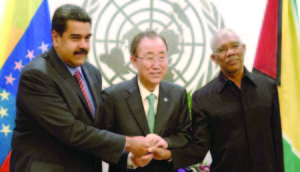Guyana, in its application filed with the International Court of Justice (ICJ) against Venezuela is requesting, among other things, that Venezuela refrain from threatening or using force against any person and/or company licenced by Guyana or engaged in economic or commercial activity in Guyanese territory.
Guyana is seeking that Venezuela “refrain from threatening or using force against any person and/or company licensed by Guyana or engage in economic or commercial activity in Guyanese territory as determined by the 1899 Award and 1905 Agreement, or in any maritime areas appurtenant to such territory over which Guyana has sovereignty or exercises sovereign rights, and shall not interfere with any Guyanese or Guyanese authorised activities in those areas,” a statement by the Principal Judicial Organ of the United Nations said.
Venezuela, an oil producing nation that is currently reeling from hyperinflation, has staunchly been against oil exploration in Guyana’s Stabroek Block, where US oil giant ExxonMobil has found more than 3.2 billion recoverable oil-equivalent barrels.

In fact, Venezuela’s National Assembly had approved an agreement to reject the oil exploration activities in March of 2017.
Moreover, Guyana in its application, also requested the ICJ to declare that “Venezuela shall immediately withdraw from and cease its occupation of the eastern half of the Island of Ankoko, and each and every other territory which is recognized as Guyana’s sovereign territory in accordance with the 1899 Award and 1905 Agreement,” and that Venezuela claims responsibility for “violations of Guyana’s sovereignty and sovereign rights, and for all injuries suffered by Guyana as a consequence.”
Since 1966, Venezuelan soldiers have been occupying the eastern half of Ankoko.
The decades old controversy between the neighbouring countries began in 1962 when Venezuela claimed that the 1899 Arbitral Award, which established the Guyana-Venezuela border, is null and void.
Guyana on March 29, 2018, submitted its Application to the ICJ requesting the Court to confirm the legal validity and binding effect of the 1899 Arbitral Award.
The Application follows the decision of UN Secretary General, Antonio Guterres, in choosing the ICJ as the next means of resolving the controversy.
In its application to the ICJ, Guyana is claiming that that the 1899 Award was “a full, perfect, and final settlement” of all questions relating to determining the boundary line between the colony of British Guiana and Venezuela.
“Guyana affirms that, between November1900 and June 1904, a joint Anglo-Venezuelan Boundary Commission ‘identified, demarcated and permanently fixed the boundary established by the Award’ before the signing of a Joint Declaration by the Commissioners on 10 January 1905 (referred to by Guyana as the ‘1905Agreement’)” the ICJ statement said.
As such, the application requests that the Court adjudge and declare that “the 1899 Award is valid and binding upon Guyana and Venezuela, and the boundary established by that Award and the 1905 Agreement is valid and binding upon Guyana and Venezuela.”



